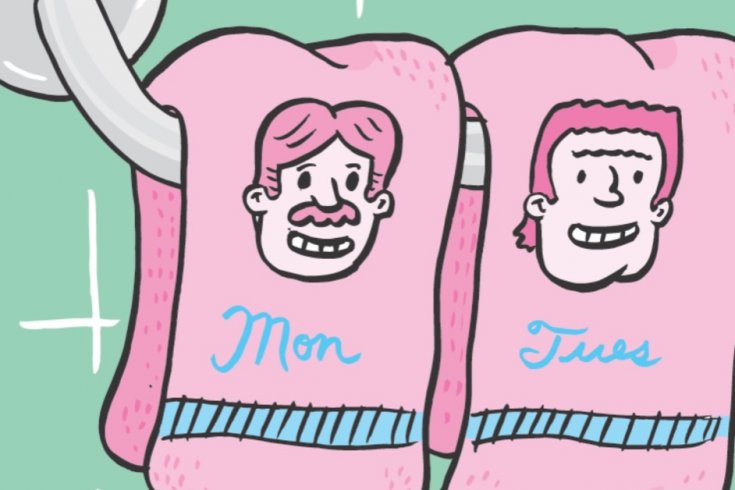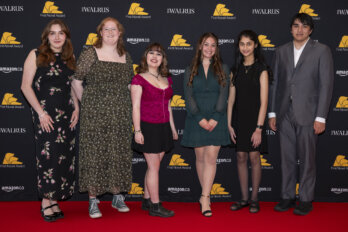
A pitch for a new one-hour television series
The concept:
Rachel Waisberg, a fiftysomething writer, loves her husband, Sam, but they haven’t had sex since their son Jason’s bar mitzvah. In what will be an ongoing motif of this groundbreaking series, God speaks to Rachel in a vision.
“Rachel,” He says, ” Sam’s a mensch, but we both know he suffers from hypochondria and erectile dysfunction. You, on the other hand, are a fox. You work out, you watch what you eat, you have regular microdermabrasion. You deserve a husband who can spin your dreidel.”
That night, while watching Big Love, hbo’s much-ballyhooed series about a polygamist who has three wives and seven children, Rachel has an epiphany. She doesn’t need a divorce. She just needs more husbands. Rachel springs into action.
“Sam, I love you,” she says to his heaving blanket mound. ” But you have sleep apnea, you come to bed with a breathing mask, and you spend half your life in the can. It’s time for us to bring a second husband into the family.”
“Hmmfff,” says Sam. Rachel is encouraged.
The next morning, easygoing Sam green-lights a brother-husband, Luke, and they all move into a more spacious loft. Then Rachel has a stroke of genius: since men are challenged in the multi-tasking department, she’ll have to acquire a different husband for every need—stick man, handyman, soulmate, design consultant, personal chef, concierge, doormat. Rachel reasons that, for a woman, the payoff will be roughly equivalent to going to heaven and having unlimited sex with seventy-two virgins.
Although God speaks to Rachel, she is a thoroughly modern matriarch. Unlike other polyandrists who abuse their husbands by forcing them to watch the Women’s Network, she treats her husbands well and wants them all to feel valued in their roles. She never interferes in their running of the household (” That’s men’s work!”) and always gives them pocket money.
Rachel eventually takes a third husband, Roy, a gay man with a background in interior design, and starts to develop a profile as a pioneer of plus-size marriage. She embarks on a lecture tour extolling the virtues of building a husband stable and spearheads a movement to teach polygamy in schools.
But what Rachel doesn’t anticipate is the fatal flaw of reverse polygamy. For a man, more wives means more affirmation, domestic order, nurturing, sexual variety, disposable income, and help finding his keys. For a woman, more husbands just means more work.
By the time Rachel puts out tenders for spouse number four, she’s feeling like a beleaguered camp counsellor. Wallets, overdue dvds, and loose change are strewn across every surface; flat-screen TVs blare night and day; and fights are constantly breaking out over Roy’s insistence on playing Leonard Cohen before breakfast. Eventually she’s forced to acknowledge that the modern woman’s future does not lie in more husbands—but in no husbands at all.
It’s true that Rachel has more opportunities for sex, a benefit she does not take for granted. But after herniating two discs when Luke jumps her in the laundry room, she is no longer enthusiastic about this perk.
The themes:
Big Love has hooked viewers by subverting traditional notions about polygamy and by making plural marriage seem like a hip, progressive lifestyle. But the show actually peddles a reactionary family-values message. Married with Husbands will expose the truth about polygamy: it’s not an equal opportunity arrangement.
The characters:
Rachel Waisberg is a funny, irrepressible, libidinous, thrice-married woman in full. She can be abrasive (” Yes, you need nose clippers. I’m just being honest!”), but she’s so much fun that men are not daunted. A successful, sexy-brainy writer who works in a home office, Rachel’s role model is Mordecai Richler, who wrote from 9 to 4, repaired to the bar to drink with his buddies, then returned to his wife, Florence, and their exquisitely orchestrated bourgeois bohemian life. Rachel’s goal is to become a crusty but benevolent materfamilias worshipped and waited on by a posse of testosterone-fuelled Florences.
Sam Shore-Waisberg, fifty-two, is an English professor turned stay-at-home dad who gave up his career when Jason was a baby. Now that Jason is in his twenties, Sam busies himself with charitable work and runs an online book club. Utterly without ego, he’s content to sing the doo-wahs while his wife bathes in the spotlight. But if Sam feels unappreciated, watch out. His legendary sulks can cast a pall over the entire household.
Luke Waisberg, thirty-six, Husband No. 2, is a bond trader with a commanding portfolio, swaggering libido, and a weakness for big booty—or so he claimed in his Lavalife profile, which also alluded to his ” impressive package.” When Rachel tells Luke that she expects him to relinquish his career and take her last name, she’s charmed when he replies, ” The career thing is overrated, and subsuming my identity into yours will make us a family.”
A talented amateur chef, on their nights together Luke promises to prepare Rachel sumptuous, nutritionally sensitive meals. Afterwards, while she soaks in a leisurely bath, she imagines that he’ll clean up, make a shopping list, walk the dog, air the duvets, organize the balsamic vinegars, do the mending, and throw out the rotting food from the fridge. Then they’ll repair to the nanny suite for sex so operatic the neighbours will complain. On paper, Luke looks like the perfect second husband. But the scales begin to fall from Rachel’s eyes when he turns out to have adhd and a compulsive shopping disorder.
Roy Waisberg, forty-two, Husband No. 3, is a darkly droll, heart-smart-lean homosexual with impeccable taste whom Rachel brings on board when she needs someone to oversee the renovation of the family cottage in Muskoka. He wears bespoke suits and has a laser eye for a room’s feng shui, but Rachel soon learns that he’s also bulimic, high maintenance, and that his moodiness can upset the household’s delicate ecosystem.
Jason Waisberg, twenty-three, is Sam and Rachel’s complicated son who returns to the nest after finishing a degree in media studies. Jason, who’s trying to make it as a documentary filmmaker, returns home to a crowded household. Uncertain of his place in the family, he decides to explore his feelings in an homage to filmmaker Allan King. My Three Dads, a searing work of cinema vérité, takes a Special Jury Prize at the Hot Docs film festival.
the arc:
At first, Rachel triggers a polygamy boom among women her age. Bonnie Fuller, editor of Us Weekly and author of The Joys of Much Too Much, instructs her househusband, Michael, to interview for entry-level husbands. The New York Times asks Rachel to write a column, ” Take My Husband, Please,” which becomes more popular than Maureen Dowd’s. Her memoir, Husband Crazy, tops the New York Times bestseller list, and her series Much Bigger Love goes into development at hbo.
But Rachel’s bountiful life masks a darker truth. Behind closed doors, her world is collapsing. The stress of spousal overload has sent her spiralling into a depression, and she starts surfing websites for tips on how to assume a new identity.
Sample scene:
[rachel arrives home bone-weary to find sam, luke, and jason sprawled on the couch watching the nba finals while roy, wired to his ipod, reads architectural digest. the coffee table is strewn with beer caps, nachos, a bottle of montepulciano, and a stunningly arranged plate of antipasto.]
Luke [without glancing up]: Hey, our queen is home. How was your day
Rachel: Did anyone start dinner
Luke: We’re in triple overtime here, Rachel.
[rachel shrugs, goes to the kitchen, and begins making herself an omelette.]
Luke: Hey, that smells good. Will you make me one, too, honey With some brie
Sam: Me too, but no brie, and egg whites only.
Rachel [yelling]: Roy…Roy…did you call the air conditioning guy
Roy [yelling, still wired to his ipod]: I forgot. I got busy scrapbooking, and the day just got away from me. Hey, if you’re making omelettes, I’m in.
Sam: Have you given any thought to what we should do for my mother’s birthday
Rachel: Why do I have to suffer She’s your mother.
Sam: A Jewish wife runs interference for her husband when it comes to his mother. It’s in the Talmud.
[more yelps, high-fives, moans, and groans. rachel gets out her earplugs and puts them in.]
Luke: Can we eat over here How’s it coming
[rachel leaves the five omelettes on the stove and slips out the door. crowd sounds and cheers from the living room.]

Illustration by Clayton Hanmer




